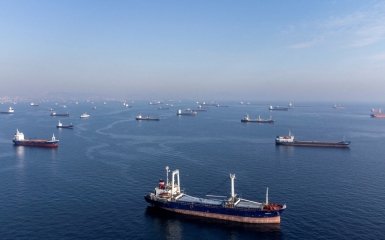Analysts from the Crimean Wind monitoring group note that Turkey has begun to block the movement of Russian cargo ships with grain and weapons through the Bosphorus Strait.
What is known about Turkey's blockade of Russian ships in the Black Sea
Analysts note that in recent days, several Russian cargo ships with weapons and grain stolen from Ukraine have been stuck on both sides of the Bosphorus Strait.
Observers note that the Russian bulk carrier GRUMANT left the port of occupied Sevastopol on February 28 with grain stolen from Ukraine on board, but was blocked at the exit from the Bosphorus Strait.
It is emphasized that the ship has been in the Bosphorus Strait for 3 days, periodically changing its berth.
The bulk carrier ZAFAR, also loaded with stolen Ukrainian grain, is in a similar situation.
At the same time, YAZ and SPARTA IV transporters, which were carrying weapons and ammunition from Syria to Russia, cannot get from the Mediterranean to the Black Sea.
In the evening of February 26, they were forced to turn back. As of March 2, YAZ is in the Syrian port of Tartus, and SPARTA IV has disappeared from the sight of observers.
Probably, two years after the start of the Russian Federation's war against Ukraine, Turkey began to respond to the secret transportation of weapons and stolen grain, analysts assume.
What is known about Turkey's sharp reduction in trade with Russia
According to the information of the Russian opposition publication The Moscow Times with reference to the official foreign trade statistics of Turkey, the volume of trade with the aggressor country of the Russian Federation, 2 years after the start of the criminal war against Ukraine, decreased by about a third.
At the same time, the volume of imports from Russia to Turkey also decreased by approximately the same amount, from $2 billion to $1.3 billion year-on-year.
Journalists of the publication note that such a sharp reduction in turnover was caused by the risk of secondary sanctions from the US.
In December of last year, President Joe Biden authorized the US Treasury Department to impose sanctions on financial organizations from third countries for helping to service deals involving sanctioned persons from the Russian Federation and for facilitating the supply of equipment to the Russian military industry
After that, banks in Turkey began to review relations with clients from the Russian Federation for fear of losing access to the dollar, which accounts for almost half of the world's financial transactions. The situation also affected Russian oil exporters, who stopped receiving money for the barrels sold to Ankara, the publication said.
It is noted that in February, Turkish banks began to close the accounts of ordinary Russian companies, although previously such restrictions applied only to those legal entities that were directly subject to US sanctions.
The Kremlin has already promised to resolve this situation with Turkey, and it has partially succeeded.
In the second half of February, some Turkish banks again began to service direct payments with Russia, but only from the so-called "green list of goods" - food products, medicines, agricultural products, texts.



